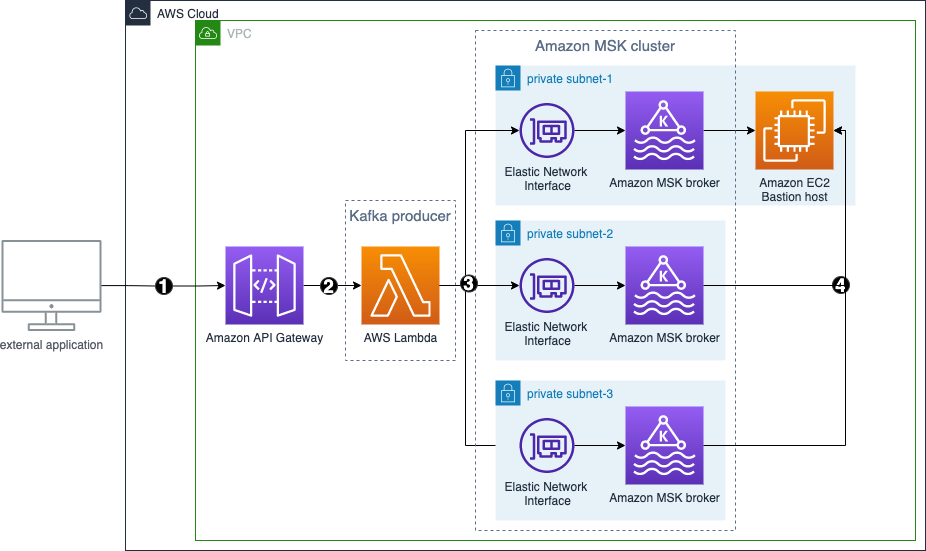AWS Compute Blog
Category: Amazon Managed Streaming for Apache Kafka (Amazon MSK)
Triggering AWS Lambda function from a cross-account Amazon Managed Streaming for Apache Kafka
This post is written by Subham Rakshit, Senior Specialist Solutions Architect, and Ismail Makhlouf, Senior Specialist Solutions Architect. Many organizations use a multi-account strategy for stream processing applications. This involves decomposing the overall architecture into a single producer account and many consumer accounts. Within AWS, in the producer account, you can use Amazon Managed Streaming for […]
Converting Apache Kafka events from Avro to JSON using EventBridge Pipes
This post is written by Pascal Vogel, Solutions Architect, and Philipp Klose, Global Solutions Architect. Event streaming with Apache Kafka has become an important element of modern data-oriented and event-driven architectures (EDAs), unlocking use cases such as real-time analytics of user behavior, anomaly and fraud detection, and Internet of Things event processing. Stream producers and consumers […]
Scaling improvements when processing Apache Kafka with AWS Lambda
AWS Lambda is improving the automatic scaling behavior when processing data from Apache Kafka event-sources. Lambda is increasing the default number of initial consumers, improving how quickly consumers scale up, and helping to ensure that consumers don’t scale down too quickly. There is no additional action that you must take, and there is no additional […]
Using custom consumer group ID support for AWS Lambda event sources for MSK and self-managed Kafka
This post shows how to use the new custom consumer group ID feature of the Lambda event source mapping for Amazon MSK and self-managed Kafka. This feature can be used to consume messages with Lambda starting at a specific timestamp or offset within a Kafka topic. It can also be used to consume messages from a consumer group that is replicated from another Kafka cluster using MirrorMaker v2.
Creating a serverless Apache Kafka publisher using AWS Lambda
In this post, you learn how to create a serverless integration Lambda function between API Gateway and Apache Managed Streaming for Apache Kafka (MSK). We show how to deploy such an integration with the CDK.
Introducing AWS Lambda batching controls for message broker services
This post is written by Mithun Mallick, Senior Specialist Solutions Architect. AWS Lambda now supports configuring a maximum batch window for instance-based message broker services to fine tune when Lambda invocations occur. This feature gives you an additional control on batching behavior when processing data. It applies to Amazon Managed Streaming for Apache Kafka (Amazon […]
Offset lag metric for Amazon MSK as an event source for Lambda
This post written by Adam Wagner, Principal Serverless Solutions Architect. Last year, AWS announced support for Amazon Managed Streaming for Apache Kafka (MSK) and self-managed Apache Kafka clusters as event sources for AWS Lambda. Today, AWS adds a new OffsetLag metric to Lambda functions with MSK or self-managed Apache Kafka event sources. Offset in Apache […]
Introducing mutual TLS authentication for Amazon MSK as an event source
This post is written by Uma Ramadoss, Senior Specialist Solutions Architect, Integration. Today, AWS Lambda is introducing mutual TLS (mTLS) authentication for Amazon Managed Streaming for Apache Kafka (Amazon MSK) and self-managed Kafka as an event source. Many customers use Amazon MSK for streaming data from multiple producers. Multiple subscribers can then consume the streaming […]
Setting up AWS Lambda with an Apache Kafka cluster within a VPC
Using resources such as NAT Gateways and VPC endpoints with PrivateLink, you can ensure that your data remains secure while also granting access to resources such as Lambda to help you create a Kafka consumer application. This post provides some tips to help you set up a Lambda function using Kafka as a trigger. It also explains various options available to send data securely.
Using self-hosted Apache Kafka as an event source for AWS Lambda
Lambda now supports self-hosted Kafka as an event source so you can invoke Lambda functions from messages in Kafka topics to integrate into other downstream serverless workflows. This post shows how to configure a self-hosted Kafka cluster on EC2 and set up the network configuration. I also cover how to set up the event source mapping in Lambda and test a function to decode the messages sent from Kafka.









